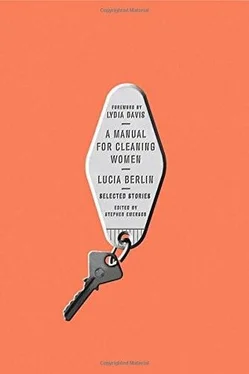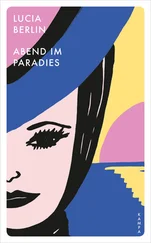Carlotta woke, during the fourth week of steady October rain, in the County detox ward. I’m in a hospital, she thought, and walked shakily down the hall. There were two men in a large room that would have been sunny if it weren’t raining. The men were ugly, wore black-and-white denim. They were bruised, had bloody bandages. These men are here from a prison but then she saw that she was wearing black-and-white denim, that she was bruised and bloody too. She remembered handcuffs, a straitjacket.
It was Halloween. The volunteer AA lady taught them how to make pumpkins. You blow up the balloon, she knots it. Then you stick gooey paper strips all around it. The next night, when your balloon is dry, you paint it orange. The lady cuts out the eyes and the nose and the mouth. You get to choose whether you want a smile or a frown on yours. You don’t get scissors.
There was much childlike laughter, because of the slippery balloons, their shaky hands. It was hard, making the pumpkins. If they had been allowed to cut out the eyes and nose and mouth they would have been given those dull dumb scissors. Whenever they wanted to write they were given fat pencils, like first grade.
Carlotta had a good time in the detox ward. The men were awkwardly gallant toward her. She was the only woman, she was pretty, didn’t “look like a lush.” Her gray eyes were clear, her laughter easy. She had transformed her black-and-white pajamas with a brilliant magenta scarf.
Most of the men were street winos. The police brought them in or they simply checked in when their SSI money ran out, when there was no port, no shelter. County was a great place to dry out, they told her. They give you Valium, Thorazine, Dilantin if you seize. Big yellow-jacket Nembutals at night. This wouldn’t be so for much longer, soon there would be only “social model” detoxes, with no drugs at all. “Shit — why come?” Pepe asked.
The food is good, but cold. You have to get your own tray off the cart and carry it to the table. Most people can’t do that at first, or they drop it. Some of the men shook so bad they had to be fed, or they just bent down and lapped up their food, like cats.
The patients were given Antabuse after the third day. If you drink alcohol within seventy-two hours after taking Antabuse you will be deathly ill. Convulsions, chest pains, shock, often death. The patients saw the Antabuse movie every morning at nine thirty, before Group Therapy. Later, in the sunroom, the men figured out how soon they could drink again. They wrote on napkins, with fat pencils. Carlotta alone said she wouldn’t drink again.
“Wha’ you drink, woman?” Willie asked.
“Jim Beam.”
“Jim Beam?” The men all laughed.
“Shee-ut … you ain’ no alkie. Us alkies drink sweet wine.”
“Oo-wee how sweet it is!”
“Wha’ the fuck you doin’ here anyhows?”
“You mean what’s a nice girl like me…?” What was she doing here, anyway? She hadn’t thought about it yet.
“Jim Beam. You don’ need detox…”
“She sure as hell did. She was a crazy woman when they brought her in, beatin’ on that chink cop. Wong. Then later she seized bad, ’bout three minutes bangin’ around like a wrung-neck chicken.”
Carlotta remembered nothing. The nurse told her she had wrecked her car into a wall. The police had brought her here instead of to jail when they found out she was a teacher, had four kids, no husband. No priors, whatever they were.
“You get DTs?” Pepe asked.
“Yes,” she lied. God, just listen to me … please accept me you guys, please like me you runny-eyed bums.
I don’t know what DTs are. The doctor asked me that too. I said yes and he wrote it down. I think I’ve had them all my life, if, in fact, they are visions of demons.
They all laughed, plastering sticky paper on their balloons. How Joe had been eighty-sixed out of the Adam and Eve, figured he could find a better bar. Climbed into a taxi hollering, “To the Shalimar!” but the taxi was a squad car and they brought him here. The difference between a connoisseur and a wino? The connoisseur takes it out of the paper bag. Mac, on the virtues of Thunderbird wine: “Dumb dagos fergot to take their socks off.”
At night after the balloons and the last Valium came the AA people. Half of the patients nodded out through the whole meeting, listening to them tell how they used to be at the bottom too. One AA woman told how she used to chew garlic all day so nobody would smell liquor on her breath. Carlotta chewed cloves. Her mother had breathed fingerfuls of Vicks salve. Uncle John always had bits of Sen-Sen stuck in his teeth, so he looked like one of their pumpkins, smiling.
Carlotta liked it best at the end, when they all held hands and she said the Lord’s Prayer. They would have to wake their buddies up, prop them up like dead soldiers in Beau Geste. She felt a closeness with the men as they prayed for sobriety, forever and ever.
After the AA people left the patients got milk and cookies and Nembutal. Almost everyone went to sleep, including the nurses. Carlotta played poker with Mac and Joe and Pepe until three in the morning. Nothing wild.
She called home every day. Her older sons, Ben and Keith, were taking care of Joel and Nathan. Everything was fine, they said. There was not much she could say.
She stayed in the hospital seven days. On the morning she left there was a sign in the rainy dark dayroom. “Lotsa Luck Lottie.” The police had left her car in the parking lot. One big dent, a broken mirror.
Carlotta drove to Redwood Park. She turned the radio up loud, sat on the dented car hood in the rain. Below her glinted the golden Mormon Temple. Fog covered the bay. It was good to be outside, to hear music. She smoked, planned what to do in classes the next week, wrote down lesson plans, library books she would need.
(Excuses had been made at school. An ovarian cyst … Benign, fortunately.)
Grocery list. Make lasagna tonight — her sons’ favorite. Tomato paste, veal, beef. Salad and garlic bread. Soap and toilet paper, probably. Pick up a carrot cake for dessert. Her lists reassured her, held everything back together again.
Her sons and Myra, her principal, were the only ones who knew where she had been. They had been supportive. Don’t worry. Everything will be okay.
Everything was somehow always okay. She was a good teacher and a good mother really. At home the small house overflowed with projects, books, arguments, laughter. Everyone met their obligations.
In the evenings, after dishes and laundry, correcting papers, there was TV or Scrabble, problems, cards, or silly conversations. Good night, guys! A silence then that she celebrated by doubling her drinks, no manic ice cubes now.
If they awakened, her sons would stumble upon her madness which, then, only occasionally spilled over into morning. But for as far back as she could remember, late at night, she would hear Keith checking ashtrays, the fireplace. Turning out lights, locking doors.
This had been her first experience with the police, even though she didn’t remember it. She had never driven drunk before, never missed more than a day at work, never … She had no idea of what was yet to come.
Flour. Milk. Ajax. She only had wine vinegar at home, which, with Antabuse, could throw her into convulsions. She wrote cider vinegar on the list.
I was five then, at the Deuces Wild mine in Montana. Every few months, before it snowed, my father and I would climb into the mountains, following blazes old Hancock had made back in the 1890s. My father carried a duffel bag filled with coffee, cornmeal, jerky, things like that. I carried a stack of Saturday Evening Post s, most of the way, anyway. Hancock’s cabin was at the edge of a crater-shaped meadow on the very top of the mountain. Blue sky over it, all around it. His dog was named Blue. Grass grew on the roof, down in a rakish fringe over the porch where they drank coffee and talked, passing chunks of ore, squinting through cigarette smoke. I played with Blue and the goats or pasted pages of the Post on cabin walls already thickly layered with past issues. Evenly in neat rectangles one on top of another all around the small room. Snowed-in in the long winter Hancock would read his walls, page by page. If he found the end of a story he’d try to make up what came before, or piece it together with other pages around the cabin. When he had read the whole room he’d paste for days and days and then start all over. I hadn’t gone up with my father the first trip that spring, when he found the old man dead. The goats and the dog too, all in his bed. “When I get cold I just pull me up another goat,” he used to say.
Читать дальше












